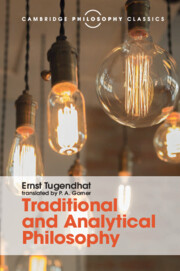Preface
Published online by Cambridge University Press: 05 August 2016
Summary
Like modern physics, analytical philosophy is mainly the invention of German speakers. Unfortunately, Nazism drove analytical philosophy out of Mitteleuropa. As a result, it had to be rediscovered after World War II. This process took several forms. Some Germanophone philosophers without prior allegiances adumbrated analytical philosophy wholeheartedly, and became mainstream analytical philosophers. Others approached analytical philosophy from their own indigenous perspective, such as the critical hermeneutics of Apel and Habermas. But their use of analytical philosophy is often eclectic. This book constitutes a far more profound attempt to combine analytical, traditional and so-called ‘continental’ philosophy. Ernst Tugendhat is a German Jew who, in 1949, returned from exile to study with Heidegger, and later immersed himself in analytical philosophy. Throughout he has used analytical tools to pursue his own questions, derived mainly from Aristotle and Heidegger. Moreover, he has done so in a way which transforms both the traditional questions and the analytic methods. His discussion of analytical and traditional philosophy is not based on pointing out interesting but ultimately inconsequential analogies, e.g. between Frege and Husserl, or Heidegger and the later Wittgenstein. Instead, it takes the form of a sustained and ambitious project which is analytical in its argumentative rigour, and continental in its methodological ambitions and historical awareness. Tugendhat tries to make a rationally compelling case for analytical philosophy by showing that it alone can realize the legitimate aims of traditional philosophy. Starting out from a highly sophisticated reflection on meta-philosophical themes, he makes a powerful case for holding that the method of linguistic analysis is the ‘defensible core’ of the venerable idea that philosophy is a priori. This case is all the more relevant, given the contemporary revival of meta-philosophy and the largely knee-jerk repudiation of conceptual analysis by an unholy alliance of analytic naturalism and essentialism on the one side and ‘continental’ irrationalism on the other.
Tugendhat demonstrates that both the ontological problems of Aristotle and Heidegger and the projects of Kant and Husserl are best pursued in the context of semantics. His theory combines a Davidsonian formal semantics with speech-act theory and Wittgensteinian ideas about use and verification in a way that is both clearer and more compelling than the far better-known attempt by Dummett.
- Type
- Chapter
- Information
- Traditional and Analytical PhilosophyLectures on the Philosophy of Language, pp. ix - xPublisher: Cambridge University PressPrint publication year: 2016

